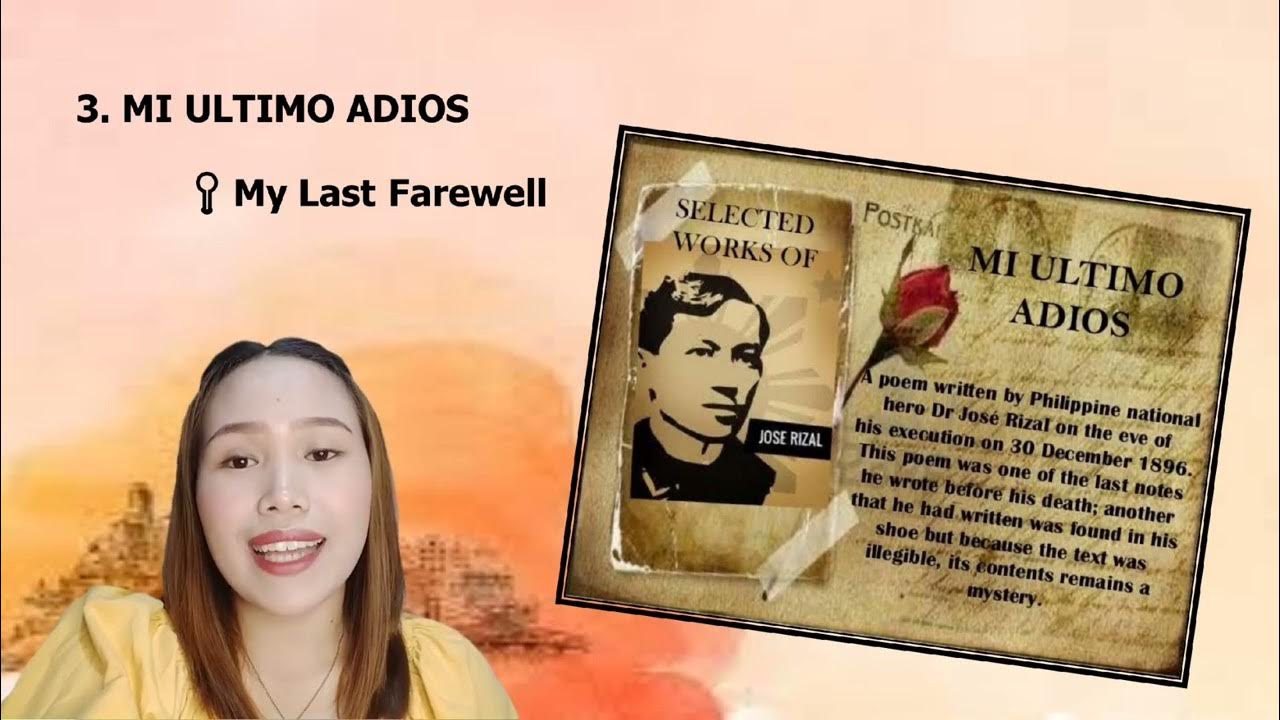NOLI ME TANGERE (A LECTURE ON THE LIFE AND WORKS OF JOSE RIZAL)
Summary
TLDRIn this lecture on José Rizal's 'Noli Me Tangere,' the instructor explores its significance as a social critique of 19th-century Philippine society. Comparing the Philippines to a man suffering from cancer, Rizal's work unveils the corruption and moral decay under Spanish rule while highlighting the virtues of the Filipino people. The discussion covers key characters like Ibarra and Maria Clara, their roles in the struggle for national identity, and the themes of power abuse and social inequality. Ultimately, the lecture emphasizes Rizal's call for education and unity among Filipinos to combat oppression.
Takeaways
- 📚 The Philippines is compared to a man suffering from stage 4 cancer, symbolizing the urgent need for societal change.
- ✍️ The title 'Noli Me Tangere' means 'Touch Me Not,' highlighting the painful truths Rizal sought to reveal about society.
- 🔍 The novel's cover features various symbols that represent themes of suffering, resilience, and oppression in Philippine society.
- 👨🎓 Ibarra is portrayed as an idealist and protagonist, representing the quest for reform and education among Filipinos.
- 👩❤️👨 Maria Clara symbolizes purity and loyalty, but her identity and circumstances reflect the struggles of women in colonial society.
- ⛪ Padre Damaso exemplifies the abusive power of the clergy, showcasing the corruption within the religious institutions of the time.
- 🔥 Elias represents the revolutionary spirit, advocating for freedom from Spanish oppression and highlighting the need for change.
- 📖 Rizal critiques not only the Spanish colonizers but also the failings of Filipinos, advocating for self-awareness and education.
- 🔗 The lecture emphasizes the necessity of unity between the masses and the elite to achieve meaningful reform and revolution.
- 🌍 Rizal's work aims to inspire national dignity and identity, reinforcing the importance of understanding one’s heritage and cultural roots.
Q & A
How does the instructor compare Philippine society to a man with stage 4 cancer?
-The instructor suggests that just as a small touch can worsen a sick man's condition, the actions of the Spaniards could ignite a revolution in the Philippines.
What is the significance of the phrase 'no limit' in the context of Rizal's work?
-'No limit' is derived from a biblical reference and reflects the themes of attachment and the struggle for freedom that permeate Rizal's novel.
What are some of the symbolic elements depicted on the cover of 'Noli Me Tangere'?
-The cover features various symbols such as a cross representing suffering, bamboo for resilience, and a burning torch for passion, each reflecting aspects of Philippine society during Rizal's time.
What motivated Rizal to write 'Noli Me Tangere' independently?
-Rizal initially sought collaboration with other expatriates, but when they delayed, he decided to forge ahead and write the novel on his own.
What was Rizal's intention in writing the dedication of 'Noli Me Tangere'?
-In his dedication, Rizal expressed his commitment to faithfully portray the conditions of the Philippines and to uncover the evils affecting society.
How does Rizal portray both Spaniards and Filipinos in 'Noli Me Tangere'?
-Rizal criticizes the greed and cruelty of the Spanish authorities while also addressing the ignorance and hypocrisy among some Filipinos.
Who are the main characters introduced in 'Noli Me Tangere'?
-Key characters include Ibarra, Maria Clara, Padre Damaso, and Elias, each representing different facets of Philippine society.
What transformation does Ibarra undergo throughout 'Noli Me Tangere'?
-Ibarra evolves from an idealistic reformist to a more radical figure, ultimately becoming disillusioned with non-violent approaches by the end of the novel.
What themes of social hierarchy are evident in the characters of 'Noli Me Tangere'?
-The novel highlights themes of social climbing and the desire of some Filipinos to align with the Spanish elite, reflecting the class struggles of the time.
What does Rizal suggest about the potential for revolution in 'Noli Me Tangere'?
-Rizal argues that a successful revolution requires both the masses and the elite to unite against their common oppressor, emphasizing the need for collaboration.
Outlines

This section is available to paid users only. Please upgrade to access this part.
Upgrade NowMindmap

This section is available to paid users only. Please upgrade to access this part.
Upgrade NowKeywords

This section is available to paid users only. Please upgrade to access this part.
Upgrade NowHighlights

This section is available to paid users only. Please upgrade to access this part.
Upgrade NowTranscripts

This section is available to paid users only. Please upgrade to access this part.
Upgrade NowBrowse More Related Video

Jetsanity's History Lectures: Analysis of the Noli

Historical Background of Noli Me Tangere | NoypiTV

Noli Me Tangere Tauhan at Katangian ng Bawat Isa | NoypiTV

ILLUSTRATIVE EXAMPLES: THE PROPAGANDA MOVEMENT

The Period of Enlightenment (1872-1898) Jose Rizal and Marcelo H. del Pilar

HISTORICAL LITERARY APPROACH + EXAMPLE || QUARTER 3 WEEK 8 || MELC-Based || Aizie Dumuk
5.0 / 5 (0 votes)